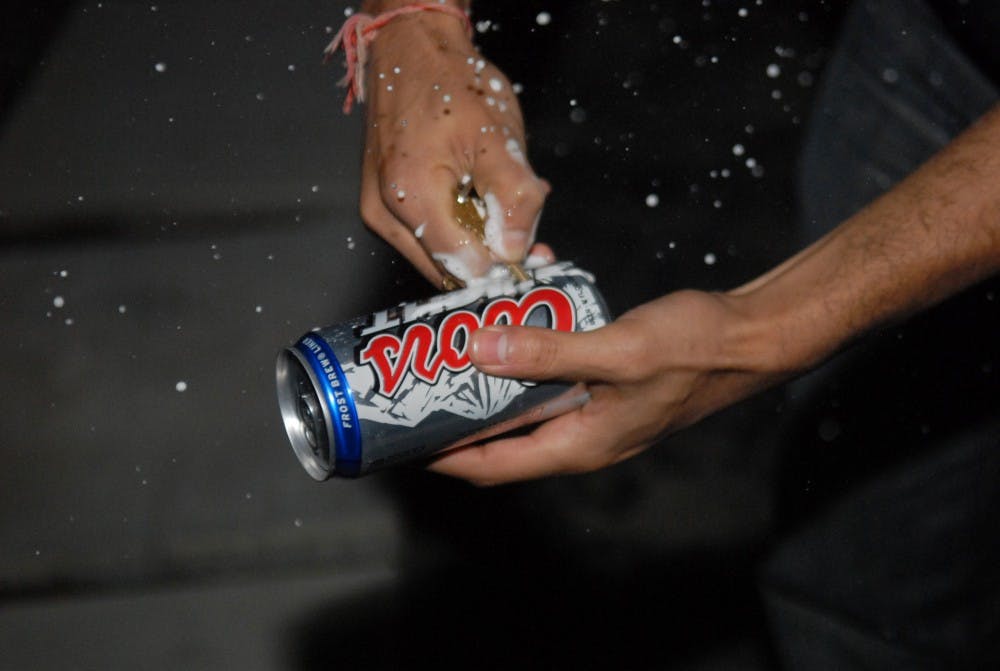
Fraternity rush consists of many more activities and lasts longer than sorority rush. (File Photo)
Members of the Penn community are critical of Brown University’s drastic changes in its alcohol policies following two incidents of sexual violence at fraternity parties, one of which involved a date rape drug.
The new rules at Brown ban alcohol in all residential areas, including Greek houses. Registered parties involving alcohol must take place in public university spaces — like Penn’s Houston Hall — with adequate supervision and must only serve alcoholic beverages to students of legal drinking age.
The fraternities where the assaults allegedly took place, Sigma Chi and Phi Kappa Psi, face serious punishment. Sigma Chi has been suspended until 2016, and Phi Kappa Psi has been stripped of university recognition for the next four years. Groups failing to follow the new rules will face similar consequences.
Penn’s alcohol policies are far less strict. Students of legal drinking age are permitted to possess and consume alcohol in college houses, and alcohol policies of on-campus Greek houses vary by chapter.
However, while University-approved parties may be held in on- or off-campus spaces, they must be registered with the Office of Alcohol and Other Drug Program Initiatives. Groups holding such parties are required to hire security guards and a bartender approved by the University.
While the AOD office acknowledges the link between alcohol and sexual assault, it does not believe that consuming alcohol leads directly to sexual violence.
“Alcohol is often involved in sexual assault, but not always, and alcohol is not the cause of sexual assault,” AOD Office Associate Director Noelle Melartin said in an email. “A person’s intoxication or incapacitation is not an invitation or an opportunity to engage in an act the person did not or could not consent to.”
Even though Penn enforces its alcohol policies at registered events, students often circumvent the system by holding unregistered parties, usually at off-campus locations. At Brown, the new regulations regarding alcohol on campus may drive students to party in more dangerous environments.
College freshman Shannah Reagan believes that Brown’s new policies will exacerbate the problems rather than solve them. “If anything, it’s going to make it more dangerous for the students,” she said. “Partying is going to happen regardless of whether or not there are rules against it.”
At Penn and at Brown, medical amnesty policies protect students from legal repercussions when seeking medical help for themselves or another after a substance-related health incident. At Brown, however, students who receive medical attention are required to “follow up with an educator,” according to the university’s website.
Reagan supports Penn’s medical amnesty policy because she believes that it emphasizes what is best for the students rather than what is most politically correct. She suggested that Brown adopt more policies that are “student-focused and realistic.”
President of Penn Drug and Alcohol Peer Advisor Program and Wharton sophomore Theodore Caputi also feels that Brown may be making a mistake in implementing their new policies. “Brown runs a serious risk in banning these kinds of parties,” he said. “When you ban parties like this, sometimes you drive them underground.”
Although Caputi’s beliefs do not necessarily represent those of Penn DAPA, he feels that Penn’s current policies — a “practical solution to address a high-risk population” — are more effective at encouraging safe consumption of alcohol.
Like the AOD Office, Caputi recognizes the link between alcohol use and sexual violence but does not believe that the relationship is necessarily causal. “I think that we walk a thin line between sexual violence and substance abuse,” he said.
The Daily Pennsylvanian is an independent, student-run newspaper. Please consider making a donation to support the coverage that shapes the University. Your generosity ensures a future of strong journalism at Penn.
DonatePlease note All comments are eligible for publication in The Daily Pennsylvanian.





